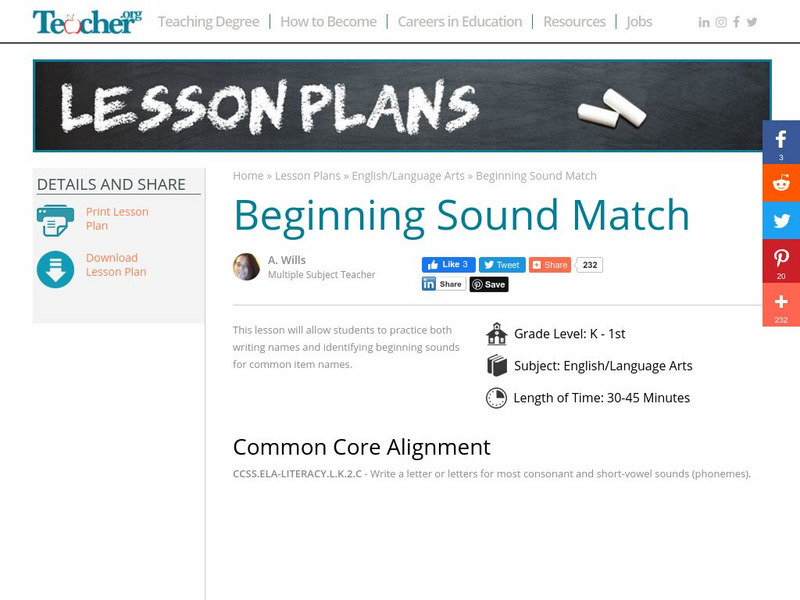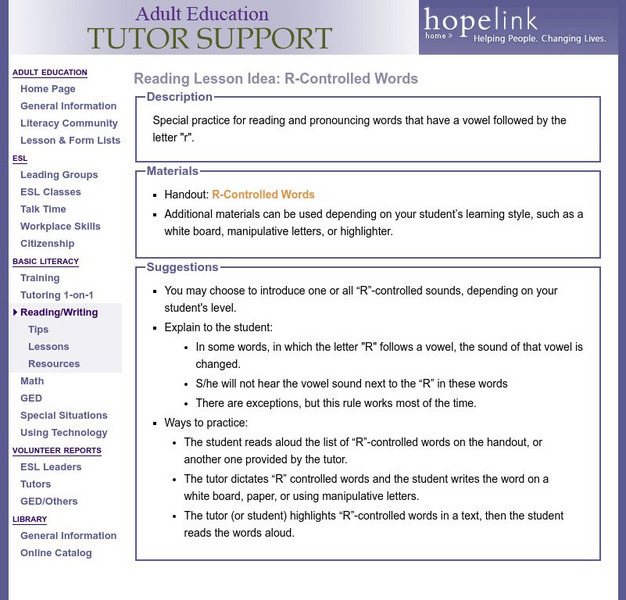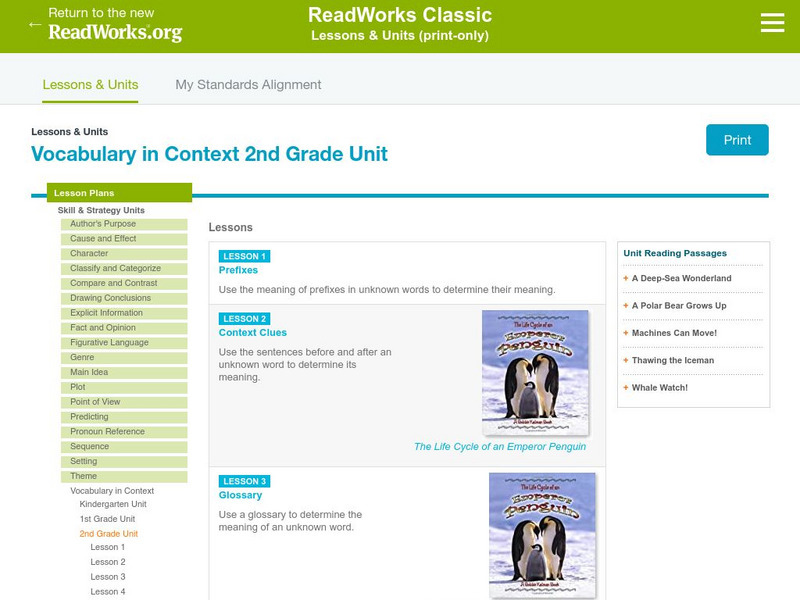Curated OER
Short Vowels With Clifford
Phonetic masters identify and recognize short vowel sounds by reading and listening to a story that highlights select words. They use picture clues to aid comprehension and construct a story by actively choosing and identifying...
Curated OER
Casper the Cat
Students examine the letter 'a'. Through instruction and modeling and a variety of practice activities, they explore the sound the letter makes and how the letter is written. They recite tongue twisters, read stories and use letterboxes...
Curated OER
Uhh I don't know!
Young scholars engage in an emergent literacy lesson in order to work on the skill of phonem ic awareness. The use of flashcards is essential for the instruction of the lesson. Students match the card with its beginning phoneme.
Curated OER
Poor Crying Baby
Students examine the letter 'a'. Through instruction and modeling and a variety of practice activities, they explore the sound the letter makes and how the letter is written. They recite tongue twisters and read stories and pick out...
Curated OER
Shhh! Quiet!
Pupils become aware that when certain letters are put together in a word they are said with a single mouth move. Through modeling and a variety of guided practice activities they explore the /sh/ phoneme. They read and identify 'sh'...
Curated OER
See It, Say It, Move It, Do It!
Learn two new letters a week with this activity! After learning the two target letters, the class will make an alphabet video "performing" each letter. The letter's name, sound, and a motion associated with it will be included in the...
Read Write Think
Poetry Portfolios: Using Poetry to Teach Reading
Over the course of five periods, scholars create a poetry portfolio. They begin with a reading of the poem, Firefly. With a focus on vocabulary, learners reread the poem then look for sight words and other skills.
Curated OER
Slim Pig
Beginning readers study the short /i/ sound. First they determine how the mouth moves when they say the target words in a tongue twister. They complete letterbox activities by making words with the short /i/ before reading What Is It and...
Curated OER
Brown Bear Phonics
Students listen to Brown Bear, Brown Bear and imitate the style of Eric Carle in writing a sentence. For this writing lesson, students use the beginning and ending sounds of words to write an Eric Carle type sentence. ...
Curated OER
"Tongue Tangle"
First graders engage in a study of phonics that focuses on the beginning sounds with an emphasis upon varying types of genres that includes songs, speech, and poetry. They recognize the beginning sounds of words and make physical...
Curated OER
Making Words - With A Twist
Students take a scrambled word and try to make other words using all of the letters. They form words out of playdough as well.
Curated OER
A Seed for All Needs
Students identify uses for plants. In this agricultural instructional activity, students read the book Spring Gardening and distinguish between food plants and flowers. Students plant flower in cups as a follow-up activity.
Curated OER
Fun On The Farm
Students experiment with a variety of resources to study about sounds and their sources (weather, animal, and transportation). They compare size, structure, and basic needs of living things. Each student studies about farm animals,...
Curated OER
Build a Word
Students explore new words through letters or letter groups. In this lesson about words, students use index cards to build new words. Each index card contains one letter or letter group. Students utilize different strategies like...
Curated OER
MMMM MMMM Yummy Cake
Learners identify the letter "m" and its sound in this lesson. They identify foods that contain the /m/ sound by making a "m" sound. They then listen to the story Stand Tall Molly Lou Melon and identify the /m/ words in the story.
Curated OER
The Pink Pig
Students identify the short /i/ sound in spoken words and the letter symbol in this lesson. They say a tongue twister emphasizing words with the short /i/ sound. They then read the story "Liz is Six" and identify the words with the...
Curated OER
"Aaaaaa!!!!" Please Don't Cry Baby!
Students complete a variety of activities as they examine the letter 'a' as it makes the short /a/ sound. Through instruction and modeling, they explore the sound the letter makes and how the letter is written. They recite tongue...
Curated OER
Science: Why Animals Hibernate
Second graders investigate the reasons animals hibernate. They measure their own heart rates and compare them to those of a hibernating bear. In their journals, 2nd graders record facts about and characteristics of hibernation and...
Curated OER
Aaaaa! A Monster!
Students complete a variety of activities as they examine the letter 'a' as it makes the short /a/ sound. Through instruction and modeling, they explore the sound the letter makes and how the letter is written. They recite tongue...
Better Lesson
Better Lesson: What Do You Hear?
Celebration words can be used to help students review and practice beginning sounds. This lesson will help students recognize and produce the initial sound of a given word. Included are an assessment checklist, videos of the lesson in...
Other
Teacher.org: Beginning Sound Match
This lesson plan will allow students to practice both writing names and identifying beginning sounds for common item names.
Better Lesson
Better Lesson: Match That Pie
Knowing the relationship between written letters and spoken sounds will help children recognize words accurately and automatically. In this lesson, children practice matching letters with initial sounds.
Hopelink
Hopelink: Reading Lesson Idea: R Controlled Words
Practice reading and pronouncing words that have a vowel followed by the letter R.
Read Works
Read Works: Grade 2: Four Lesson Unit: Vocabulary in Context
[Free Registration/Login Required] A series of four lesson plans designed to develop students' vocabulary skills including understanding prefixes, using context clues, and using a glossary and a dictionary. Lessons are based on the books...























